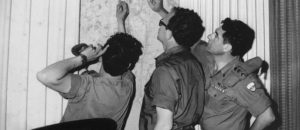Operation ‘Addictive Candy’: How Israel Silenced a Spy Privy to One of Its Darkest Intelligence Debacles

Amit, left, with Maj. Gen. Mordechai Gur and Col. Benjamin Inbar.
Loaded with tranquilizers and psychiatric drugs, he was gripped by three male nurses in white gowns, who took him to the treatment room. He was apathetic, his eyes were glazed, his gaze unfocused. They made him lie on a bed and attached electric cables to his head. This was the first electric shock treatment administered to Maj. Amit, a former outstanding intelligence officer in Israel Defense Forces Unit 504, which operates agents abroad. Eleven more treatments were to follow.
The time was the late 1970s. The location: the Mazor psychiatric hospital in Acre, in northern Israel. The background is one of the darkest and ugliest episodes of Israeli intelligence; any and all information about it is still sealed. Because of the gag orders, I will code name it “Addictive Candy,” for the purpose of this article. It involved systematic illegal activity by the state over many years, and publication of its details could bring disgrace to many former intelligence officials and give Israel a bad name.
Amit – who prefers not to reveal his first name – played a secondary role in the affair, until he asked to be relieved. The security authorities, for their part, were apprehensive that he would not keep the affair secret and decided to go to extreme lengths to prevent him from talking. They might have gone too far.
Initially he was charged with espionage, no less – the allegation being that he had shared details of the operation with members of the unit who lacked the proper security clearance. It was also claimed that he had been a drug dealer. Later, the army authorities said they would drop the charges if he would agree to be confined to a closed ward. The confinement and the electroconvulsive treatments were only part of a lengthy saga of threats and humiliations by the army, the police and the Shin Bet security service. Its height came in the 1980s, when Amit was again charged with espionage, this time for initiating contact with CIA agents. For that, he was sentenced to 12 years in prison.
I have been following Amit’s story for more than 20 years. A host of disturbing questions still hover over it, and won’t go away. During this whole period I have attempted time and again to report the tale of the “Addictive Candy” operation. I failed. The stubborn insistence by the intelligence bodies to conceal and bury the story brought me to the conclusion that it stemmed from shame, and not from real concern for national security. The security authorities and the courts blocked every attempt of mine by means of secrecy ordinances, gag orders and sweeping censorship.
Recently I tried again to shatter the conspiracy of silence, along with journalist Doron Galezer and attorney Shlomy Zachary, and backed by former senior military and government figures, including an Israel Defense Forces general, who believe, as we do, that the time has come to shed light on this old case. Once again, however, the justices of the Supreme Court, in a closed-door session, decided to reject the request, after hearing the director of Military Intelligence, Gen. Tamir Hayman, ex parte.
